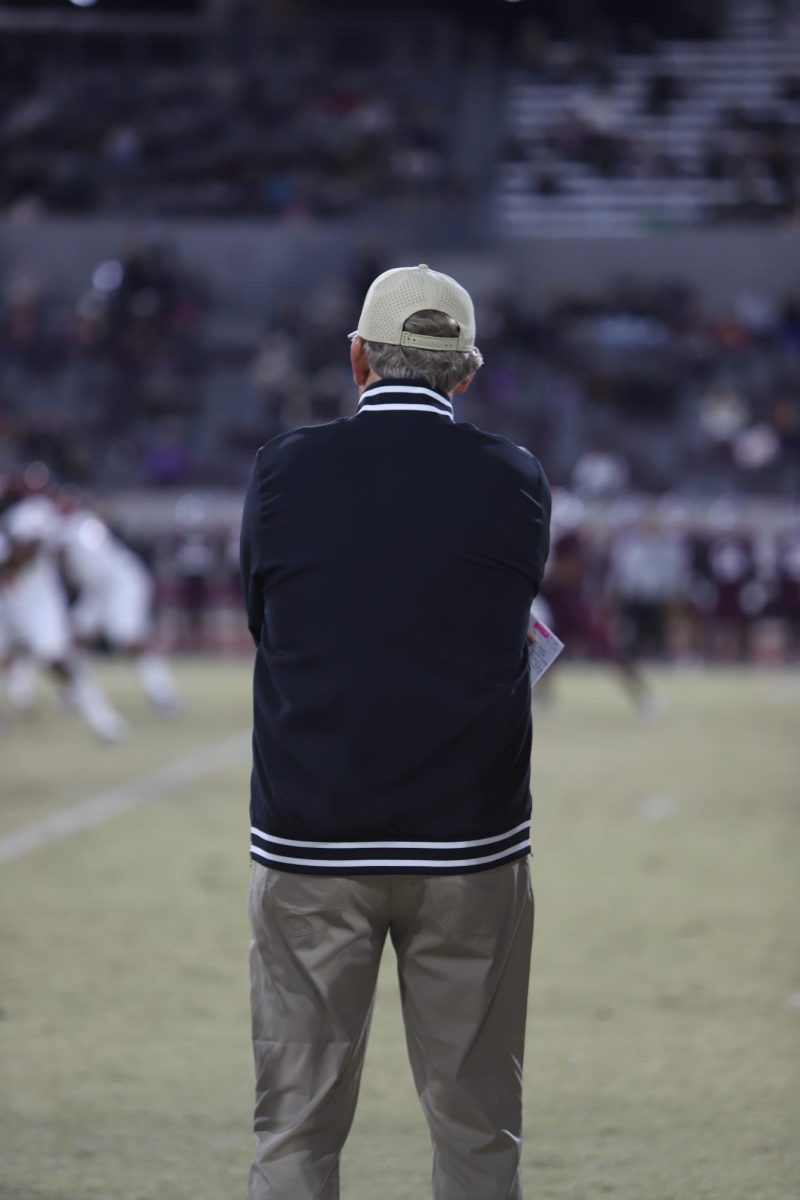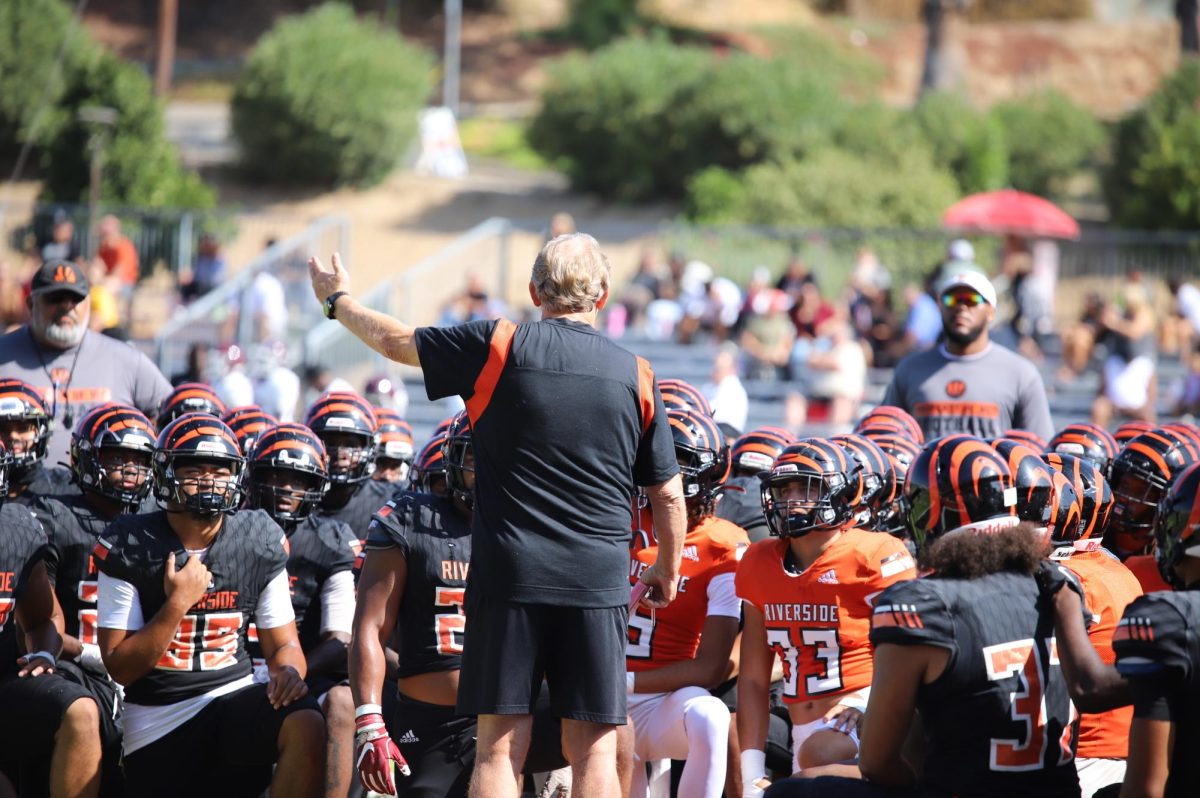Success (n.) The accomplishment and achievement of a purpose or aim.
For many football coaches and players, success means winning. Many consider winning the conference championship, a state title, or an individual award a success. For a young boy from Iowa City, Iowa, success means more than the “sexy thing” of winning. The mission and statement of success is to develop an experience and enhance one as a man and football player to propel them into their future endeavors.
In a 30-year career, no one has won more at the California Junior College level than Tom Craft. As head coach across three junior college programs, he has 261 career wins, five state titles, 21 conference championships, and 28 postseason wins. His team’s success doesn’t even begin to scratch the surface of Craft’s accomplishments. He is a two-time American Football Coaches Association National Community College Coach of the Year, five-time California Community Colleges Athletic Association Coach of the Year, 10-time Regional Coach of the Year, and 19-time Conference Coach of the Year. None of that compares to the over 600 student-athletes’ lives he impacted by being able to transfer them to a four-year university.
“That’s why I think I was in this job, to help kids,” Craft said.
Hanging up the whistle
Craft made his hour-and-a-half-long commute to Riverside City College on Dec. 9. The same commute he’s made for the past 15 years. This past year, he had his son Kevin right by his side, not only in the car where they passed the time talking about football and life, but also on the sideline. Kevin returned to RCC in the Spring of 2024 to serve as the team’s offensive coordinator and quarterbacks coach. This commute was different however, after a Dec. 7 loss in the SCFA Championship game to Mt. San Antonio College ended the Tigers season, there was no next year.
No film breakdowns for game-planning or adjustments to be made, no looking at the recruiting board and figuring out the next steps for the offseason and into spring ball.
“This was my last season.” Tom Craft said. “I’m 71 years old, and I’ve slowed down. I didn’t want to hang on and compromise the program.”
He had been very transparent with the RCC administration about his intention to retire before the season began, feeling as if 2023 may have been his final season. The Tigers won the state championship in 2023, but Tom was burnt out. With limited offensive assistant coaches, he took on the role of offensive play-caller and quarterbacks coach. Although the result was a great success, Tom was ready to wind it down.
Kevin Craft served briefly as the Tigers’ quarterback coach in 2010 before heading overseas to continue his playing career after his college football career at Mt. SAC and the University of California Los Angeles. Kevin’s first stop was Paris, France, to play for Les Cougars of Saint Ouen au l’Amone. Kevin broke all the league and single-game records as quarterback for the Cougars while also serving as offensive coordinator.
He then headed to the land of the rising sun to play for the IBM Big Blue of the American Football X-league, once again breaking records as quarterback and offensive coordinator. Kevin would be promoted to head coach and transitioned into solely being head coach in his final three years in Tokyo, Japan. Kevin’s innovative offense was something never before seen in Japan, and he decided after 2023 to return home.
Tom Craft hired his son as offensive coordinator and handed over the reins of offensive play calling. Tom cited Kevin’s experience at the professional level and helped him stay up to date with football trends in his final years of coaching. Kevin’s energy and progressiveness were things that Tom and the team needed.
“I wouldn’t have made it through the season if he wasn’t taking over that responsibility,” Tom Craft said. “He’s learned a lot from me, and I’m proud to say I’ve learned a lot from him.”
Although the Tigers fell short of going back-to-back, the 2024 season was still a triumph. Quarterback Brady Jones became the most prolific passer in school history, which garnered him his commitment to Western Michigan University. The offense as a whole averaged over 53 points per game and nearly 600 yards per game. The Tigers were once again National Southern Conference Champions and won 10 games, which Tom did 13 out of the 14 years as head coach.
As Tigers head coach, Craft amassed a 146-22 record (86.9 winning percentage) and became the only coach in 3C2A history to win 100 games for two programs: RCC and Palomar College. The 18th head coach in Tigers history also won two 3C2A State Championships, 12 conference titles, 14 consecutive postseason appearances, and 10 straight Southern California Football Association title games.
Despite the prosperity of the program, Tom feels the football team was undervalued and wasn’t celebrated nearly enough by the RCC administration.
Not getting the recognition.
Tucked away in the basement of Wheelock Gym are the football offices. The cold concrete walls, the loud echo every time someone takes a step, and the blaring sound of utilities make it so the sound of success has been muffled.
“We’re buried,” Tom Craft said about his office location.
Craft sits in the back of a dim film room, gazing upon the room where many young men have walked in and out of throughout the years. But Craft’s view of the whiteboard at the front of the room, where he projected film and jotted up the X’s and the O’s for countless years, is obstructed by a pillar in the center. In the left corner, the wall is marred with holes and peeling paint. An old grease board that hasn’t been able to be used for numerous years still hasn’t been taken down. Chairs and desks less than two feet wide are expected to seat nearly 200-pound football players.
This isn’t the first time Craft has had an issue with his facilities’ infrastructure. Back in 2022, RCC was forced to play their entire home season at nearby Ramona High School as the playing surface of Wheelock Stadium was finally mandated to be replaced after years of poor treatment and problems with irrigation and aging turf.
Craft went on record saying that RCC “should not have football” that season to Dennis Pope, a reporter at The Press-Enterprise because of the safety and health concerns of his players.
Then, in 2023, the Tigers were forced out of their locker room because of water damage and unstable infrastructure. The locker room situation was given a quick fix but not to the standard expected to support over 100 football players and staff. The space is still too small, and the showers do not work.
Craft mentions how he was told to hush about these concerns by the administration in fear that they would shut the area down and force the Tigers to play in another location again.
Despite fielding one of the best Junior College football programs in the nation year after year, they have not received the proper resources.
“We don’t have the resources and the infrastructure that other programs have,” Craft said. “But we’ve done more with less. I think some people in the department take issue with me saying that. But I’m trying to get things to improve and let people know what’s going on here to acknowledge the fact that we’re not supporting student-athletes in the best way we can.”
The lack of support goes beyond providing money for new facilities. As you walk down into Wheelock Stadium, you’d expect to see banners or other monuments commemorating the success of the Tigers. But there’s not much. No signs to show that they won two state championships in four seasons.
“It’s like the school doesn’t care,” Craft said. “The administration doesn’t care about what we’ve done here.”
Craft recalls first coming to take a visit to RCC when he was applying for the head coaching position, seeing the Tigers’ 1989 football state championship trophy tucked away in a closet. Also, upon looking at the locker room, which Craft felt was not up to standard, a board member who was a part of the tour told him, “If it was good enough for the 1989 state championship team, it’ll be good enough for you.”
“I said, wait a minute, if I ran the same plays that I did in 1991 when we won the first of our three state championships at Palomar, we’d probably go 1-9,” Craft said.
“You need to evolve as a person, as a team, as a scheme, in your workouts, and you need to evolve in your facilities, your infrastructure,” he added.
As you drive down Olivewood Avenue and look to your right, you can catch a glimpse of Wheelock Stadium and its scoreboard. However, that scoreboard displays a schedule from 2013.
“That’s an embarrassment,” Craft said. “I’m not responsible for that. The department and upper management should be responsible for that. To want to recognize excellence.”
Craft concerns go beyond just the playing surface, the lack of an adequate weight room to support the largest and most diversified group of athletes on campus remains an issue for the football team.
He feels his concerns have gone on deaf ears for the need for better facilities for the enhancement and injury prevention of his athletes.
Craft affirmed that the problem had been attempted to be solved across the four athletic directors that he had in his time at RCC.
“It’s not like the Athletic Directors aren’t trying to address it, they are,” Craft said. “We’re not getting any support at the next level.”
The team that knocked RCC out of the 2024 playoffs, Mt. SAC, recently underwent a 62-million-dollar renovation to their football and track stadium. The Board of Trustees granted $7.7 million to the Tigers in 2023 to fix the playing surface and track of Wheelock Stadium but not the locker room and surrounding facilities.
Craft hopes with the passing of Measure CC in the election of 2024; there could be some changes and upgrades. The measure allocates nearly a billion dollars to the Riverside Community College District to help improve facilities and access to higher education. But Craft fears that these upgrades to the athletic facilities may be put to the bottom of the list, and when it’s time to get to them, they may be out of money.
“We have to have somebody that appreciates it,” Craft said.
Despite the lack of resources and struggle to get the facilities up to par, Craft feels the experience and development you get as a student-athlete in Riverside is second to none.
“If you’re picking a program because of their facilities and weight room, you’re picking the wrong thing,” Craft said. “It’s all about what your experience is going to be from a standpoint of development and being able to transfer.”
“I think we’ve done that better than anybody,” he added.
The road to glory
Thomas Craft grew up in Northern California with two brothers and a single mom and began playing football early on.
Craft’s mother told him from a young age that his coaches were going to be his father figures. He recalled many of his coaches throughout the years from Pop Warner, Pacific Grove High School, and Monterey Peninsula Community College. Although these coaches may have been great people and helped Tom develop into the man he is today, they were not necessarily the best coaches.
It wasn’t until he left home in NorCal and arrived at San Diego State University that he felt he truly developed as his own man and a football player.
Although he didn’t start on the field until his senior year, Craft’s success resembles that of his final apprentice at the quarterback position, Brady Jones. Craft led SDSU to a 10-1 season his senior year as team captain and quarterback.
Craft then got some NFL free agency looks from the Tampa Bay Buccaneers and Buffalo Bills. But his priorities had started to change during that final season at SDSU.
“I felt like I was good enough to play earlier (at SDSU), but I wasn’t given the opportunity,” Craft said. “If I ended up on an (NFL) team and I’m fighting for a roster spot, and someone who got drafted higher than me ended up getting the spot even though I think I may be better, that would really crush me.”
Craft decided to enter the football coaching world, specifically at the junior college level, because of the experience he had playing at that level himself. He wanted to coach at a level where he knew he could be close to home and not have to worry so much about his job security, which he referred to as “having to move around the United States like I’m in the service.”
He began his coaching career the year after he graduated from SDSU at Palomar College in 1977, serving as quarterback and wide receiver coach. In his third year at Palomar, he was given the play-calling duties despite not being the offensive coordinator.
He developed his now patented no-huddle offense, and in its first season, quarterback Steve Krainock, who went on to play for the San Diego Chargers, led the nation in passing. Despite the success on offense, the team still struggled to win games. A change needed to be made. In 1983, that change was made when Craft, now 28 years old, was named the head coach.
Craft finally got his opportunity to become a head coach and run his offense the way he truly wanted to. But taking the job was bigger than managing a football team.
“I was part-time for six years,” Craft said. “I was plastering. I was doing scaffolding, and I was trying to be the head football coach. I was also teaching overload classes to make ends meet.”
The long days would end at 8 p.m. as Craft would get home from work exhausted, just in time for a cold dinner. He would spend some time with his kids and talk to his wife before heading to bed to wake up the next day at 5 a.m. to do it all over again.
The job security in Craft’s life allowed him to lead Palomar to three state championships faster than any coach has done at the junior college level.
His proudest accomplishment, however, was developing an academic adviser role for the athletic programs to help transfer student-athletes. In his two separate stints at Palomar, he was able to transfer over 300 student-athletes to universities. Largely in part due to having stability in merging athletics and academics.
In Craft’s time away from Palomar, he served as his alma mater’s offensive coordinator and quarterbacks coach from 1994-96 and the team’s head coach from 2002-05.
In February of 1996, Craft wanted to get closer to home and was preparing to tell SDSU head coach Ted Tollner that he was going back to Palomar to move to be more involved in his children’s lives.
Tollner informed Craft that he had received a call from Norv Turner, who was the head coach of the Washington Redskins at the time, who was looking for a young-minded offensive coordinator. This was Craft’s chance to get into the NFL. But Craft did not like the idea of having to move him and his young family around and turned it down.
Despite not taking the opportunity, Craft does not regret it because he wanted to stay close to his family.
“An NFL opportunity would have been better during these last 10 years because my kids were all grown up, and they had successful jobs, so my wife and I could move around if we had to move around,” Craft said.
He came to another crossroads when being asked to come back to SDSU in 2002, this time to be head coach.
Craft turned the job offer down on multiple occasions, but at 2 a.m. one day, he woke up and realized that this opportunity was too good to pass up and he could still be at home with his family.
“I took it, but I knew I was going to be displaced, and that’s just the profession,” Craft said. “You’re going to get fired.”
Craft had some success, making a bowl game once, leading a top 20 offenses in the nation, and improving game attendance to nearly 36,000. However, a month after taking the job, he knew it had been a mistake because of the many problems that needed to be addressed within the program.
“We had to address a lot of imbalances in our recruiting at the time,” Craft said. “By the time I got to that point, the athletic director made a change.”
“I was a stopgap guy,” he added.
After he was fired in 2005, Craft took some time volunteering at Palomar College, where he enjoyed the laid-back style of not having to worry about being head coach but still being able to help the players.
A couple of years later, he went to Mt. SAC, served as the offensive coordinator, and coached his son Kevin to be an All-American that season. In the three years he was there, Mt. Sac made the state championship game all three years and won it in 2009.
At that time, Tom was also working at the fire academy as his teaching assignment at Mt. Sac. His class was the last class the firefighters had to go through before becoming certified.
“I loved it. I did that for three years, and we made the state championship in all three years,” Tom Craft said.
Tom was not interested in being a head coach anymore, content with his current lifestyle and his career already filled with major accomplishments.
Mentorship
A young bare-faced Thomas Craft walks into the office of, at the time, SDSU defensive backs coach Ernie Zampese; smoke fills the air, Zampese with his cigarette lit on his lip and his feet kicked back on his desk, he breaks down film with Tom, who he is trying to get to convert to safety.
Zampeses sentiment did not work out, but Tom cherished those moments of being able to learn from one of football’s greatest minds.
Zampese was just one of the many mentors Tom had throughout the years, not only in life but in football.
Coaches who taught him the art of the passing game, such as Zampese, were Tollner, Bill Walsh, and Don Coryell. These coaches instilled in Tom from a young age the art of football and how to navigate the passing game, which helped build the foundation of the style of offense that Tom ran and evolved with throughout his 30-year coaching career.
When Walsh and Zampese were at the NFL level, Tom got the opportunity to attend practices and meetings of the Chargers and San Francisco 49ers. Tom was shocked when observing these practices at how easy it is to pass the ball.
“It’s easier to throw the ball at the (Division I) level than it is here,” Craft said. “At the NFL level, it’s even easier because they can’t touch you. I found that out very quickly when I was at SDSU.”
Craft was not the only one who felt that way, as he learned one day at a practice of the Chargers.
“What’s the most challenging level to coach,” Craft asked Zampese.
“Junior college,” Zampese replied.
That challenge comes with the constant turnover of rosters and the influx of transfers that come into junior college whose morale and confidence may have been damaged at their previous school.
One of those transfers came to Craft at RCC before the 2022 season.
Tom welcomed him into his office and asked him off the bat, “Do you want to be coached hard?”
“Do you want to develop,” Tom followed up.
He believes that you should go where you can develop but not necessarily immediately get playing time.
That player was current Brigham Young University quarterback Jake Retzlaff, who was transferring from Golden West Community College.
Tom assured him that he was going to double his passing numbers, become an All-American, and transfer to whatever school he had his eyes on.
All of which he accomplished with the Tigers.
The Eye of the Tiger
Former Athletic Director of RCC Barry Meier needed to make a change to the Tiger football team in 2010. The morale of the team was shot after 20 years of subpar seasons and minimal transfers to the next level.
Tom Craft was the first name on the list of calls for Meier’s. Tom wanted an outlook on the program and its expectations, so he took a visit down to the Dirty Riv.
“Do you have an academic adviser in athletics,” Tom asked.
“No,” Meier’s replied.
That was a dealbreaker for Tom as he felt they were not truly committed to developing the program without one.
Meier’s was persistent in pursuing the coach, so he called the vice president of student affairs at the time down to their meeting, where Tom outlined his expectations for that position, and they agreed, which is when Tom committed to being a candidate for the job.
Coming to RCC also allowed Tom to be closer to home, and it eased the stress of travel as he got older.
After four years of leading the Tigers, the academic adviser position was fully in place, with Lauren Overbo taking on the task.
This was critical in Tom’s process of turning around the Tigers, which he did immediately. The Tigers made the SCFA playoffs in every season they were eligible and only lost three or more games once during his tenure.
Most importantly, Craft transferred over 330 players to university.
He is a man who is obsessive about details, which is why he developed a coaching manual that he handed out to each of his coaches when they came on board at RCC.
“This has been a great experience,” Craft said. “It’s kept me committed.”
Tigers next step
In Craft’s 30th season in coaching, the stars aligned. He was able to coach with his son, and he was offered the “Golden Handshake” by the RCC Board of Trustees, which provides a faculty member a retirement incentive of 80% of their base pay. The process only happens every 5-6 years and is chosen randomly.
“We kept everything at a premium,” Craft said about his time as Tigers head coach. “Everything worked out great.”
RCC Athletic Director Cliff Dochterman will miss Craft’s presence. The two had developed a close friendship in Dochterman’s’ short time as AD.
Dochterman also admired Craft’s willingness to learn and grow despite all he’s done.
In week three or four of the 2023 season, Craft asked Dochterman for an evaluation of how he was as a coached
“You’re an extraordinary coach,” Dochterman said. “But you’re an off-the-charts educator.”
“Master coaches are very hard to find,” Dochterman added. “We were very lucky to have one in Tom.”
The Tigers will need to look for someone to take on the impossible task of following Craft as the head coaching search is expected to be posted by the end of February, according to RCC Interim Vice President of Student Services Thomas Cruz-Soto, who will be a part of the committee to hire the new head coach.
Tom’s son Kevin is expected to be a candidate, along with long-time defensive coordinator James Kuk. The search will ultimately be nationwide, and Dochterman has already done his due diligence in reaching out to other potential candidates.
“We would really like to have someone that has community college experience because the culture is that different,” Dochterman said.
Whoever it may be has to have the willingness to evolve and conquer the challenge of succeeding the greatest football coach in school history.
Tom provided a model of how to run a program at any collegiate level during his coaching career.
“The guys that have been in this program have an appreciation for what they went through and what they were a part of here,” Dochterman said.
Craft will be immortalized with his induction into the Riverside sport Hall of Fame May 5 at Fowler Events Center on the campus of California Baptist University.
Success can mean many things to many people. “I taught the game of life through football,” Craft said.
That was his success.














